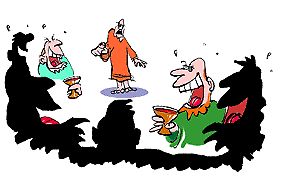
The hero Odysseus in Homer's epic from Greek mythology

Book Twenty
|
The next morning Odysseus asks for a sign, and Zeus sends a clap of thunder out of the clear blue sky. A servant recognizes it as a portent and prays that this day be the last of the suitors' abuse.
Odysseus encounters another herdsman. Like the swineherd Eumaeus, this man, who tends the realm's cattle, swears his loyalty to the absent king. A prophet, an exiled murderer whom Telemachus has befriended, shares a vision with the suitors: "I see the walls of this mansion dripping with your blood." The suitors respond with gales of laughter. |
 |  | 
|
| murderer The murderer's name was Theoclymenus (thee-oh-KLIM-en-us). He had killed his own cousin and was running from the vengeance of the man's kin when he met Telemachus in Pylos. Telemachus did not think twice about granting him refuge. |
|
|
|
Featuring the hero Odysseus in Homer's epic from Greek mythology
|
 Book Twenty
|
|
The next morning Odysseus asks for a sign, and Zeus sends a clap of thunder out of the clear blue sky. A servant recognizes it as a portent and prays that this day be the last of the suitors' abuse.
Odysseus encounters another herdsman. Like the swineherd Eumaeus, this man, who tends the realm's cattle, swears his loyalty to the absent king. A prophet, an exiled murderer whom Telemachus has befriended, shares a vision with the suitors: "I see the walls of this mansion dripping with your blood." The suitors respond with gales of laughter. |
 |  | 
|
| murderer The murderer's name was Theoclymenus (thee-oh-KLIM-en-us). He had killed his own cousin and was running from the vengeance of the man's kin when he met Telemachus in Pylos. Telemachus did not think twice about granting him refuge. |